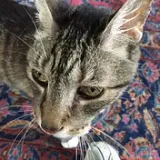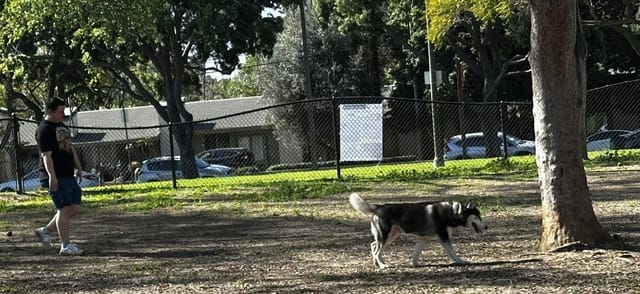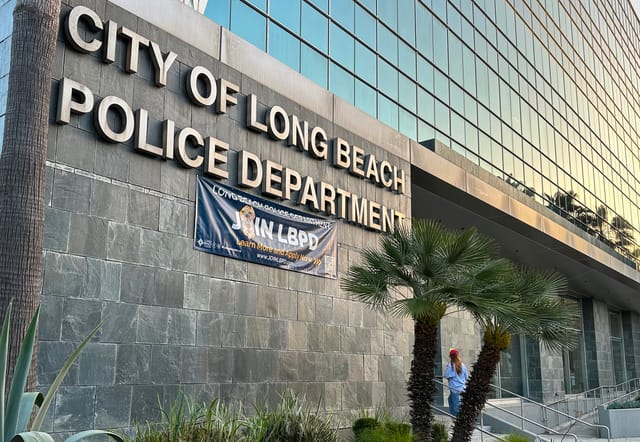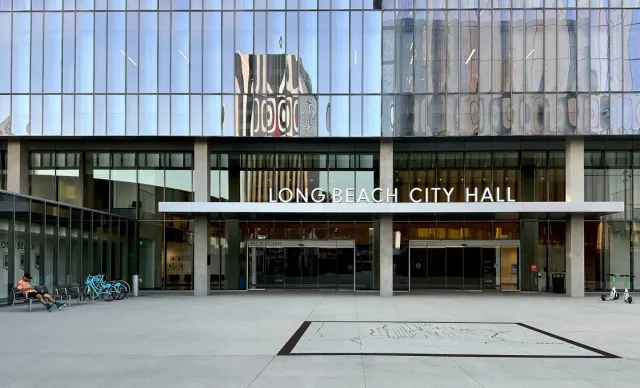Scratch This: Compassion and generosity are not species exclusive
Long Beach resident acts on her feelings to benefit unhoused pets and their humans.
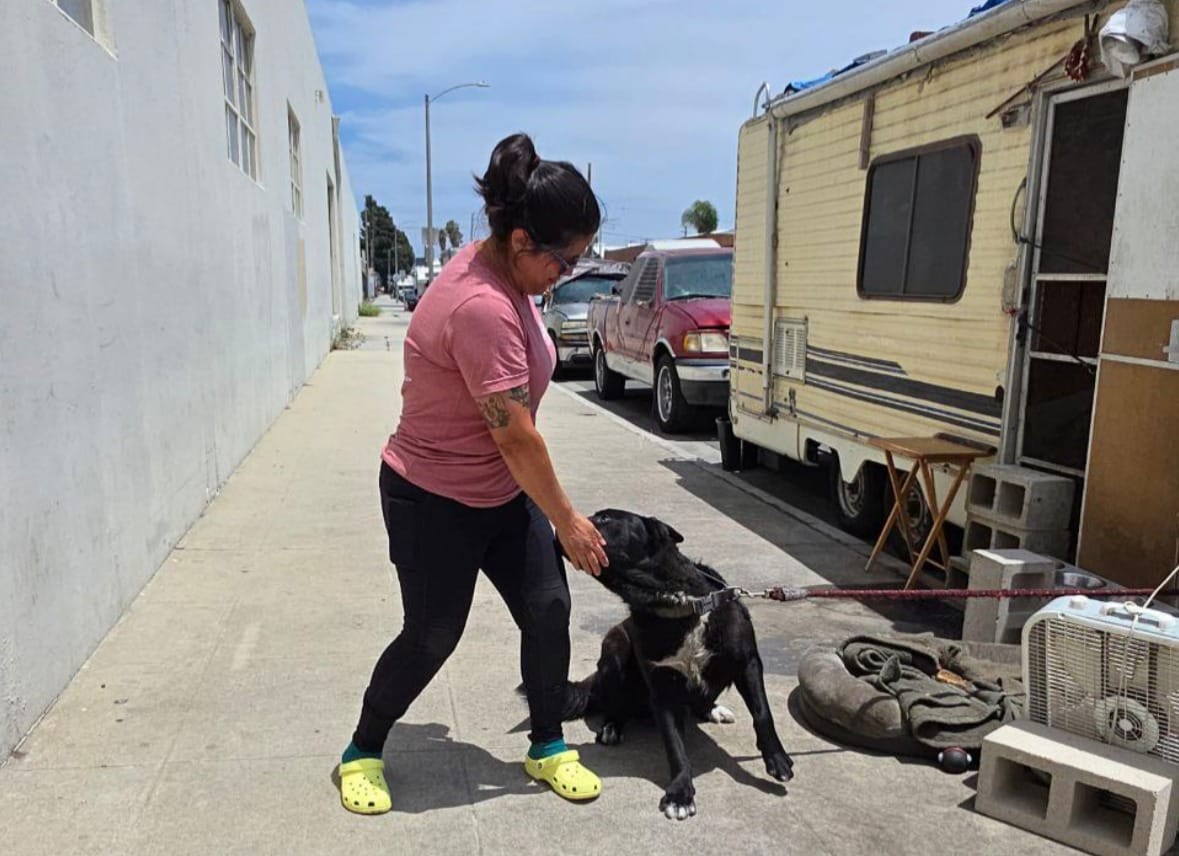
Cynthia Lopez holds down a job as a medical assistant; volunteers for multiple nonprofits, including Long Beach Animal Care Services (LBACS); and is a wife and a mom. She’s also survived cancer.
Lopez loves animals and seems to like humans a lot, too. With a little help from her friends and her daughter as well, Lopez regularly extends outreach to people with pets. She helps them with food, health items, medical care and getting off the street.
With all that going on. Lopez is remarkably even-tempered.
“I’ve always thrived in a high-pressure environment,” she said. “I believe that’s what helps me get through it!”
Empathy frequently stops at the feeling, like when you sit on the sofa and choke up at commercials of starving children and abused pets. Maybe you send some money. Lopez, however, has lived it, and has worked her compassion since she was a teenager.
Lopez grew up in Compton from the mid-1980s to the early 2000s. She remembers her and her mother, a single parent, barely getting by.
“We would go without electricity or water for weeks at times,” Lopez said.
Despite the struggle, or maybe because of it, Lopez felt sympathy early on for people and animals in similar situations, and she acted on her feelings.
“I will never forget walking down the alley on my way home from school and observing a houseless individual giving his dog his last drink of water,” she said. “It just hit me — we forget how lucky we are to have basic needs until we don’t have them anymore. Anyway, I somehow got the courage to ask if there was anything I could bring him. He simply replied ‘Water,” and that was it. That’s how it started.”
What started was Lopez’s ongoing outreach to unhoused people, with their pets as conduits, in three main areas of North Long Beach. She generally goes alone, sometimes bringing her daughter after making a connection.
“The people are everywhere,” Lopez said. “Sometimes, I stumble upon camps by catching a glimpse of a dog. Other times, my friend and outreach contact tells me about them when he stumbles across them. He brings them pet food, starts a small conversation, and I come in and discuss vet care, continued support and in some cases, surrendering some of their animals. After that, I do biweekly check-ins, then weekly ones. Eventually, they trust me enough to ask for rehoming help and encourage others to accept my help. I’ve known some of these folks for years now.”
The animals, Lopez said, are the conversation starters. Depending on how animal and human are doing, Lopez encourages them to get their pets fixed and finds services for the procedures. If the human is having trouble caring for the animal, she helps with rehoming. She also connects the humans with resources that will help them get off the street and find work.
Does Lopez find cats?
“All the time!” she said. “Friends of Long Beach Animals just helped me with one.” The cats get fixed, too.
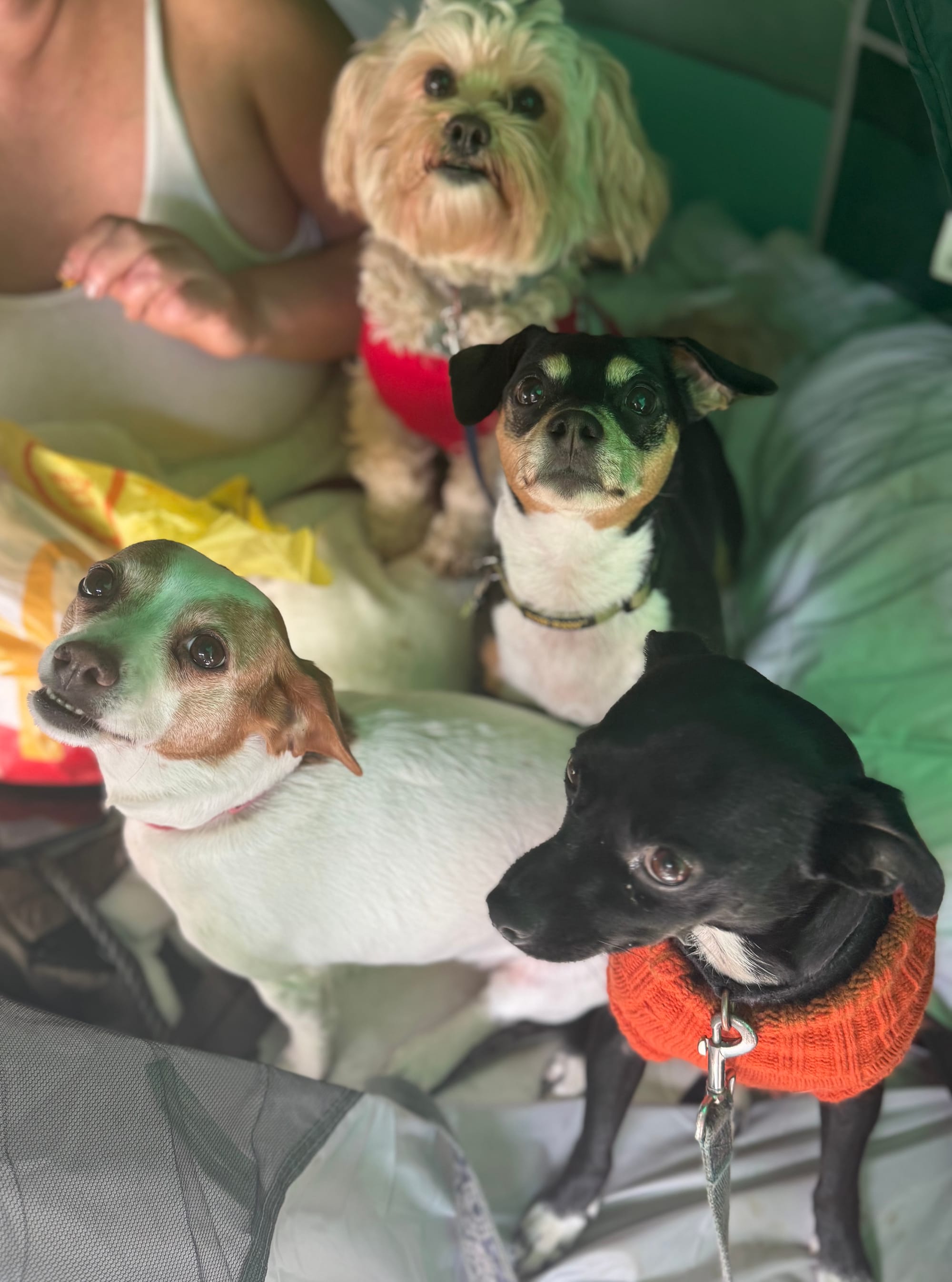
One of the largest encampments that Lopez helps consists of women only, except for one man who keeps the women safe, Lopez said. One of the women is the dog ma of Roxy, Midge, Minnie and Lulu (shown above), all of whom have been spayed. Lopez has provided food and care as well as the tents the people live in.
Without a nonprofit status, Lopez relies on rescue organizations, donations from community members, and her own income to fund her outreach. She’s passed it forward through her grown daughter, who goes with her to give out donations like blankets, socks, clothing, nonperishable food items and even tents. The pets, who guide Lopez to the humans in the first place, get their angel’s share and then some.
“I’m lucky enough to have great relationships with animal rescue organizations and social media supporters,” Lopez said. “They help donate much-needed dog food, leashes, collars, and sometimes help cover vet care. I’ve connected with low-cost spay and neuter clinics that allow me quick appointments, and I’ve made many friends who are veterinarians, who help guide me on what is medically necessary.”
Lopez said that not only has the area’s animal community supported her outreach but her employees have as well. So has LBACS, with what Lopez described as a massive case.
“One of the encampments had over 14 dogs, and the shelter helped with them,” she said. “Every dog was released except two, which got adopted.”
All the dogs were spayed or neutered, and each was microchipped with Lopez’s contact information. She’s the point of contact for dogs that live with unhoused people.
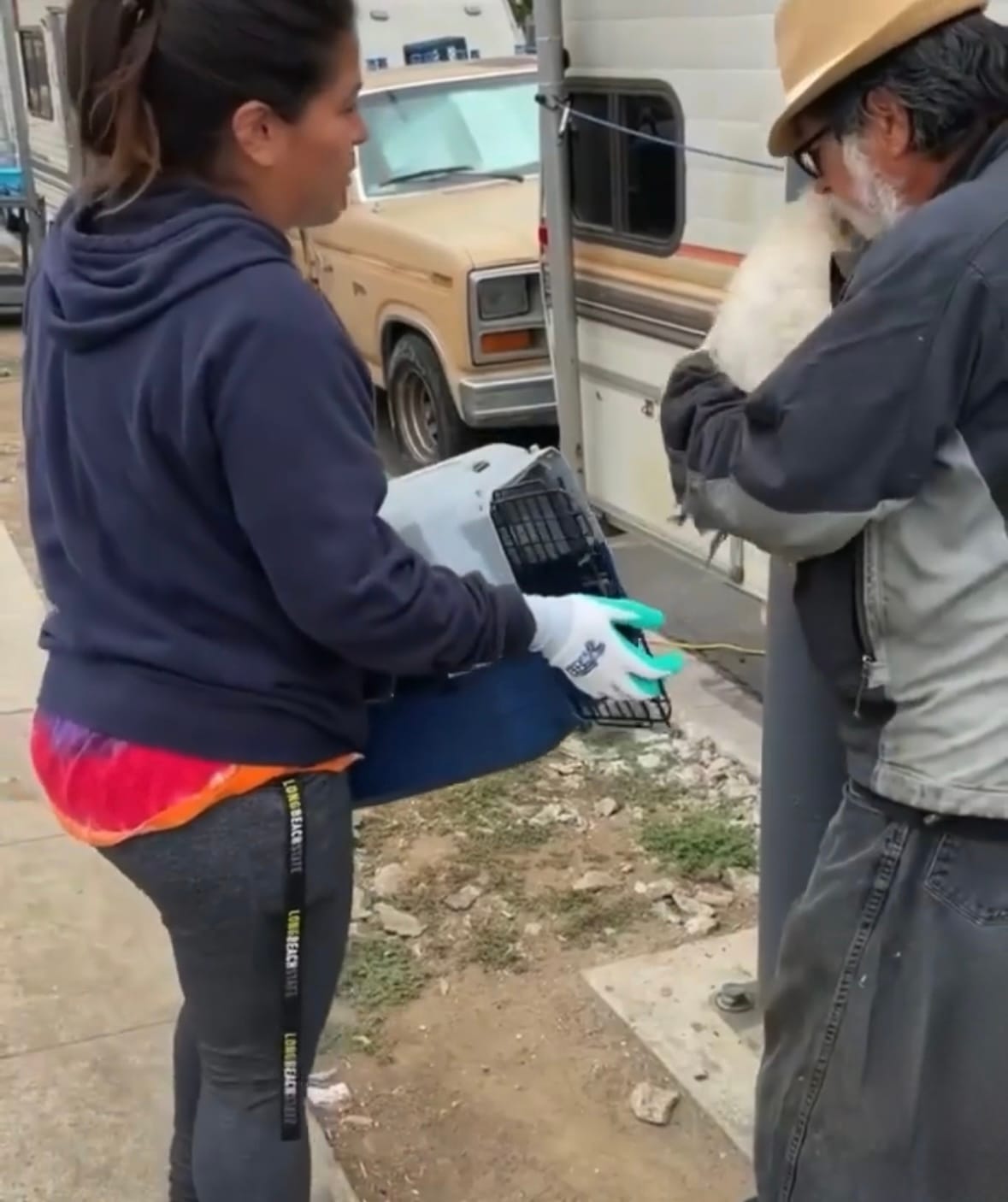
Outside of her outreach partners, Lopez doesn’t give the exact locations of the encampments out of respect for the safety of people and pets and also to protect her relationship and trust with them. The small successes give her heart — she showed me a text from a former encampment resident, thanking her for helping them get their life together: “Starting my new job and moved to LA today … Hopefully, I’ll be able to get you back or pay it forward very soon.”
News like that helps Lopez maintain her equilibrium and determination. She also knows well how an animal can help people without homes or jobs maintain their own purpose, particularly if they give them their own last gulp of water.
“There are so many people out there bashing the houseless individuals online,” Lopez said. “That extremely negative narrative creates this idea that no houseless individual deserves to have an animal and that they are all monsters, which isn’t the case. I don’t post a lot of the work I do because of that reason. I have good relationships with some of the displaced individuals, and that has led to entire camps trusting us. It makes it much easier to convince them to sterilize their pets or to surrender them if needed, with no need to lie or pay.”
Humans can get snarky about animal advocates not doing good for humans in need, and animal advocates, me included, sometimes say that animals are more deserving than people — animals have no voices but are usually grateful and loving.
Not true either way, Lopez will show you — generosity and empathy are inclusive of all species, including ours.
“Folks can extend their compassion to the human behind the dog,” she said. “I’m very protective of the houseless community members who have shared their stories and struggles. I’ve learned how they ended up on the street, where they stand on housing listings, their pets name, how long they’ve had them. I have successfully acquired over 20 voluntary owner surrenders in the last year alone. I’ve sterilized multiple pets, and have plans to keep doing so.”
Even for Lopez, it can get overwhelming. She has days when she sits in the car and cries.
“There are so many things we take for granted — little things like drinking water can make or break a person,” she said. “The one promise I make the people I see, and the one promise I intend to keep, is that their pets will always be cared for.”
“I am open to help from people who can approach these situations with no judgement — just a desire to help,” Lopez said. “it gets dirty, sometimes tense, in these situations.”
If you want to help people on streets and encampments, particularly those with pets, email Lopez at cyn.lopez.84@icloud.com. Email her to donate any items for human, pet or both. Access this link for Lopez’s wish list, a bank of resources for anyone who needs them, and other helpful information. Follow her work on her Instagram page.
YOURS DROOLY
Long Beach is lucky to have an animal shelter like Long Beach Animal Care Services. The pets here are particularly fortunate — staff and volunteers knock themselves out caring for them, training them, making them adoptable, and loving them. The pets come from everywhere — encampments, as described in the article; hoarding situations; dumped in boxes; running around neighborhoods; hurt while running into the street; and relinquished by people who cannot or will not care for them any longer.
We’re lucky to have such a facility, and it would be a gift if everyone were like LBACS. But even the LBACS volunteers and staff will tell you that a shelter is no place for an animal. They all need to go home, especially the big dogs, which are taking up a lot of kennels. If you adopt one or even foster for a few weeks, it’ll help save lives and make them, too!
Speed the process to adopt or foster a shelter pet by emailing PetAdopt@longbeach.gov or petfoster@longbeach.gov. You can also call 562-570-4925. Shelter hours are Wednesday through Friday from 10 a.m. to 5:30 p.m. and Saturday and Sunday from 10 a.m. to 4 p.m. at 7700 E. Spring St. at the entrance to El Dorado Park (no parking fee for shelter visitors).
Check out LBACS’ adoptables here. Here are three hopefuls waiting for you.
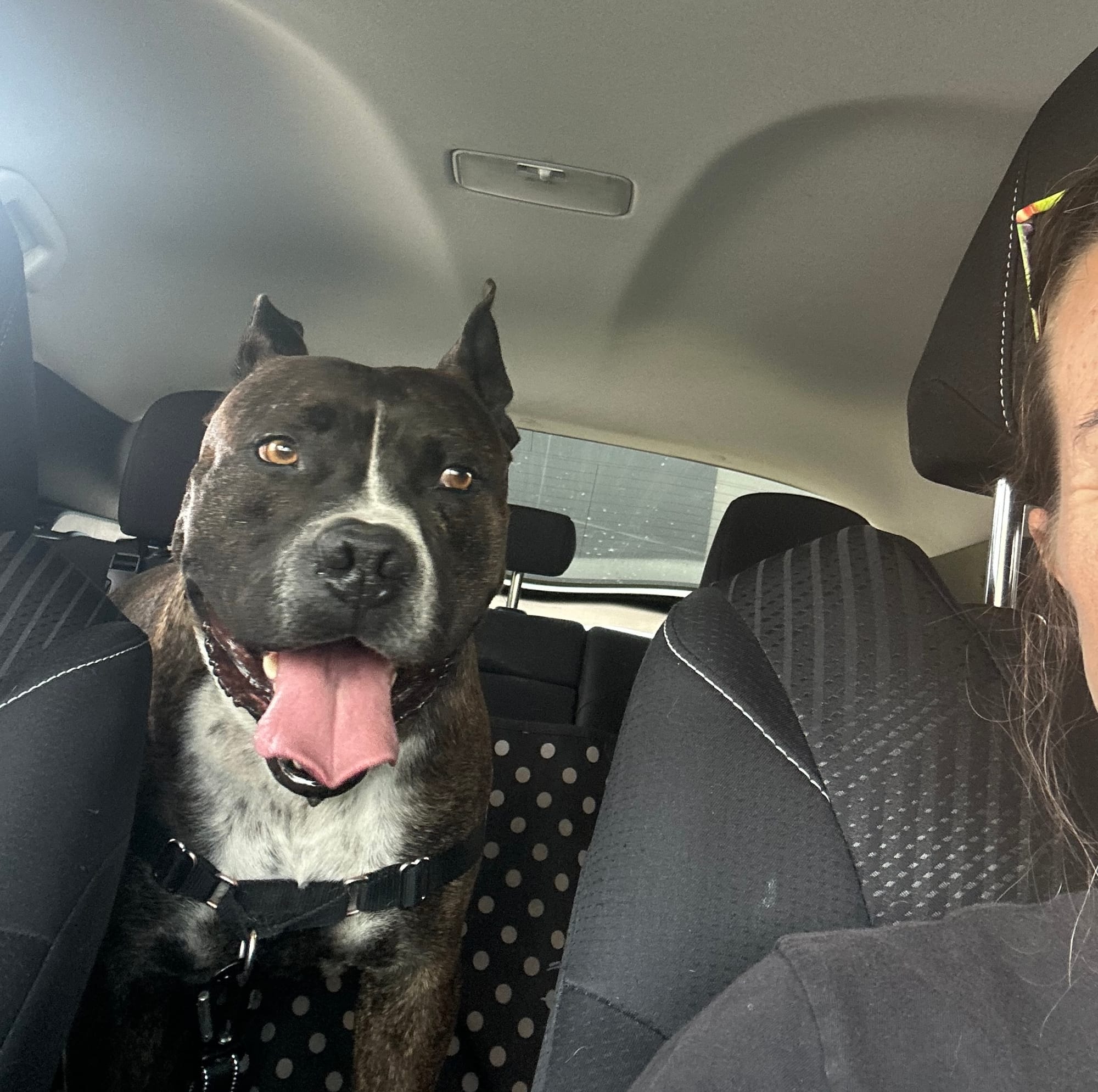
Gumbo (ID#A705236) is a snuggle bunny, an enthusiastic walker, a loveable pup, but with all the big dogs at LBACS vying for attention, he’s gotten lost in the shuffle. He’s been at LBACS for — get this — over 680 days, and counting. That’s three quarters of the way to two years. Gumbo has a huge fan base, and they are committed to finding him a home. (Watch this montage that actor and animal buddy Tom Kiesche made for Gumbo!).
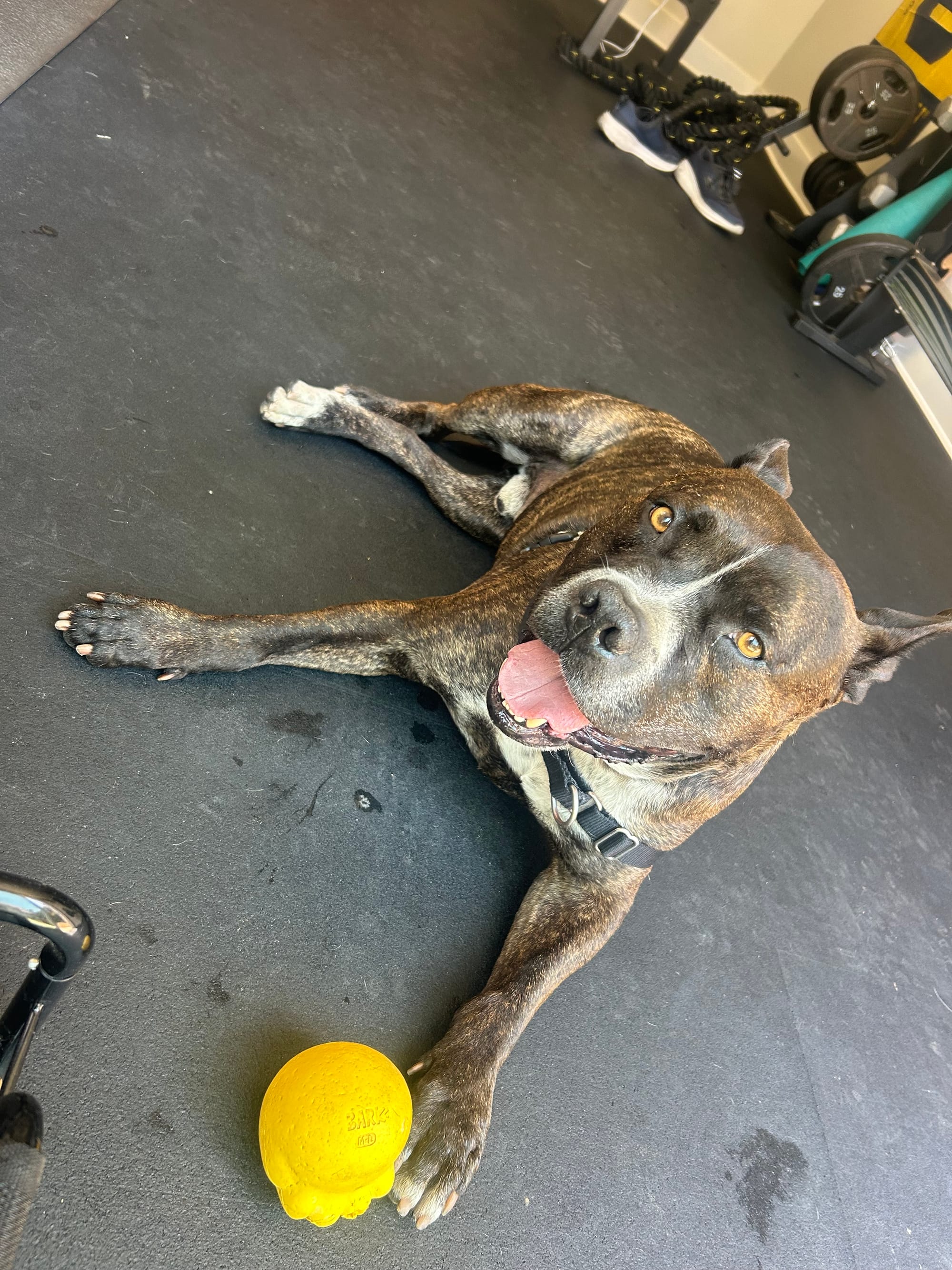
The photos are from a Fido Field Trip, which Gumbo took to a volunteer’s home. There, he got to be a dog, and everyone had fun. He wagged his tail at the volunteer’s little dog through a glass door (shelter dogs don’t interact with personal pets in their homes) and clearly wanted to play with him, and practiced his leash manners. The volunteer said that he’d do well with a doggie friend or maybe a kid. Or just you.
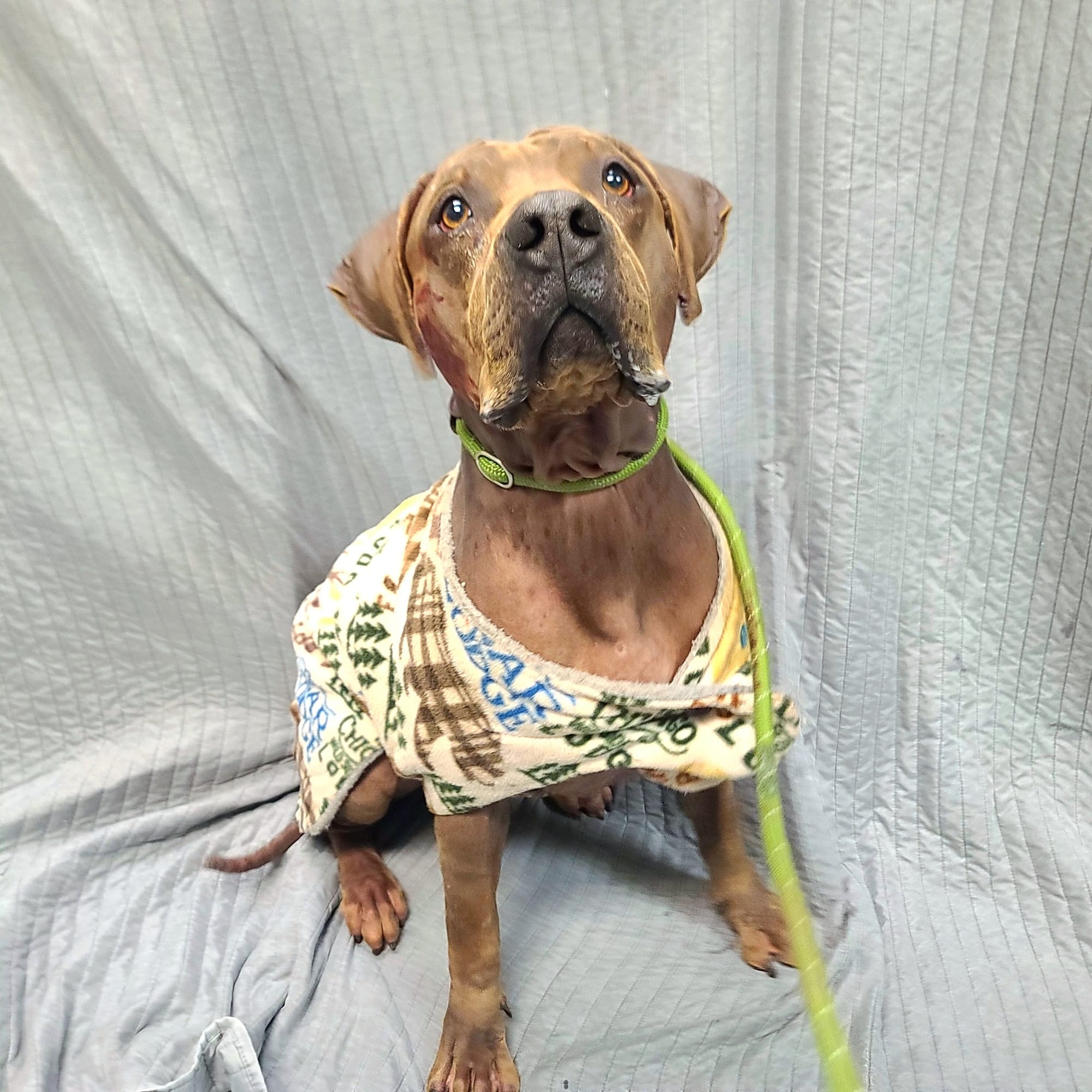
Sanderson (ID#A731759) wears doggie clothing as if it were a second skin, and “skin” is the key word here. Sanderson, 3 years old, was found in a parking lot with three other dogs, and he was the only dog without fur! His coat consists of a thin, brown fuzz. After three months of treatment and observation, the staff concluded that Sanderson was a mix of mastiff and Xoloitzcuintle, a hairless dog from Mexico whose breed dates back to the Aztecs. Despite his noble lineage, Sanderson is silly, waggy and happy. He plays joyfully in the play yard with his favorite toy, a stuffed lamb. The only thing missing for this historical hound is a home!
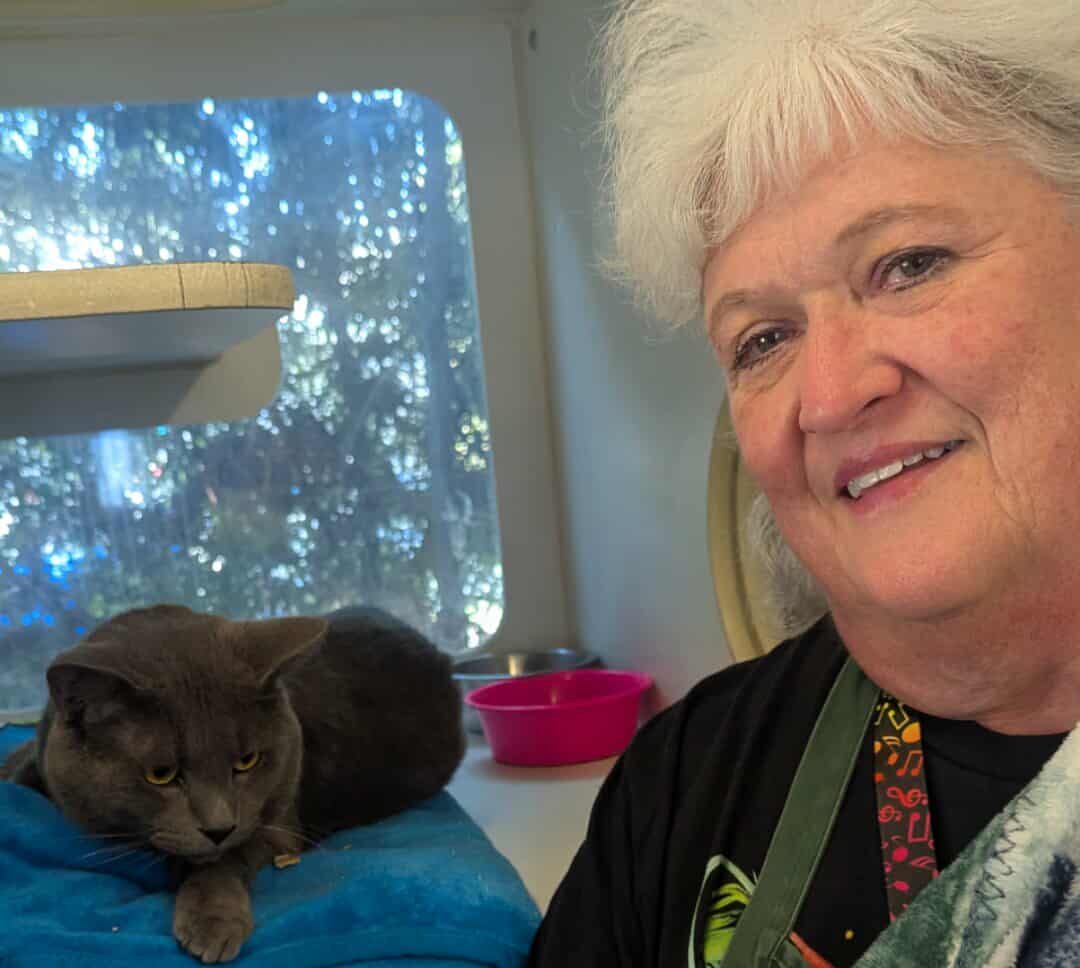
What are the benefits of keeping a cat indoors? For one, they won’t get hit by a car. Gregory (ID#A740895) was brought to the shelter in May, suffering from multiple pelvic fractures. According to the shelter vets, he was likely hit by a car. He had surgery six weeks ago and is due for a recheck. He’s a sweet fellow with a thick, soft, gray coat. He’s sweet and accepts pets, and is ready to play once he has a safe place to swat toy mice around and unroll the toilet paper. He’s only a year old, and has eight lives left. He’d love to spend them inside your home.
TAIL-WAGGIN' AND NOSE-BOOPIN' EVENTS
Frost Fund’s Sweat to Protect event
Frost Fund, the little nonprofit that could and does provide support to shelter dogs, will host another of their Sweat to Protect workout fundraisers. A few of our Long Beach Animal Care Services pups and their doting volunteers will showcase themselves, and you can adopt or foster any of them (the dogs, of course, and not the volunteers). This Sweat to Protect event will take place in an Orange County park.
Sweat to Protect takes place Saturday, July 19, 9 a.m.–11 a.m. at Grijalva Park, 368 N. Prospect St., Orange, donation based
Show Us Your Kitties! calendar fundraiser
Whether you’re a cat person, just like cats, or need to learn to love them, checking the date on a wall calendar embellished with a veritable clowder of cats is perfect for you! Your cat can be a part of it, too. Cats are notoriously good at taking up space, and yours can take up one or two when you enter them in the Helen Sanders CatPAWS 2026 calendar contest. Top vote winner gets their choice of month to feature their pointy-eared pal, and the 11 runners-up will each be featured on a calendar month. There’ll be room for a lot more on the back cover, and you can also purchase a date to celebrate your cats and give them their own holiday!
Access this link for instructions for how to enter your cat in the Show Us Your Kitties calendar contest. Entries may be submitted until Saturday, Sept. 14 at 9 PDT. Voting ends Sunday, Sept. 14 at 9 p.m. PDT.
Benny’s Birthday and Love Your Pet Party
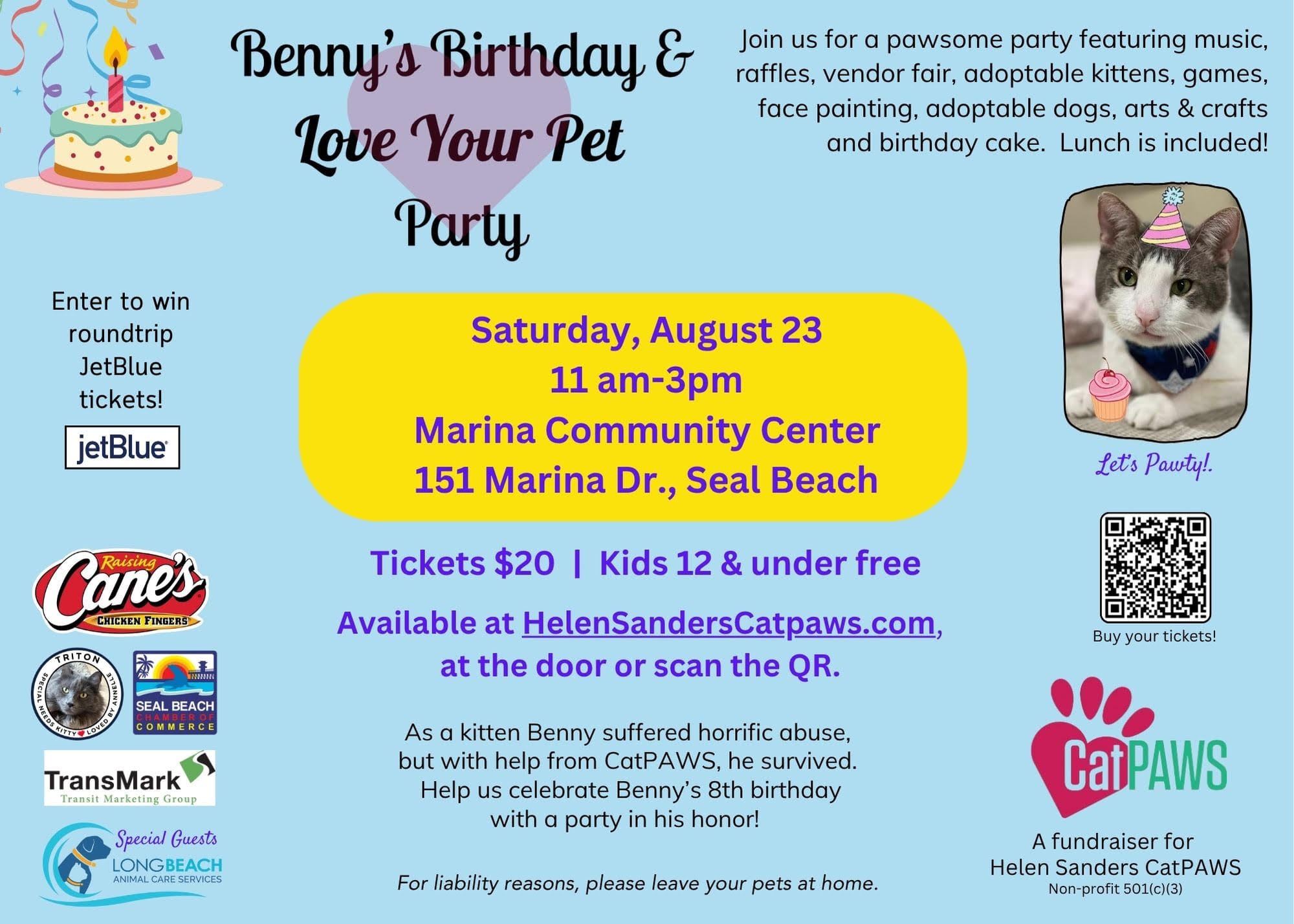
Benny the Cat is turning 8 years old this year, and that’s reason to celebrate! After the abuse he received at just a few months old, at the hands of a heartless owner, it was doubtful that he’d see even his first birthday. But his now-mom Bev, the staff at the shelter, and Helen Sanders CatPAWS provided the care he needed, and he made it. Read his story here.
To celebrate Benny and all the little lives he’s had an impact on, CatPAWS throws a party for him every year! Read the little flyer above for information, including ticket sales, and join Helen Sanders CatPAWS for fun, games, prizes and celebrating Benny’s survival of abuse and leading his best life!
Benny’s Birthday takes place Saturday, Aug. 23, 11 a.m.–3 p.m. at Seal Beach Marina Community Center, 151 Marina Dr., Seal Beach. See flyer and visit this link for all information.
Need a low-cost veterinarian, information about trapping community cats, places to volunteer, rescues and shelters to adopt from — anything pet related? Follow this link for resources. Please add your own ideas in the Comments section.
We need your support.
Subcribe to the Watchdog today.
The Long Beach Watchdog is owned by journalists, and paid for by readers like you. If independent, local reporting like the story you just read is important to you, support our work by becoming a subscriber.

